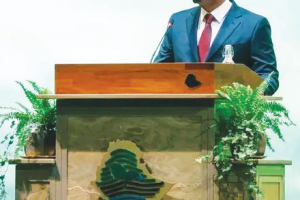
BY DARGIE KAHSAY
The Abbay Dam, widely known as the largest power plant in Africa, has been a source of significant controversy among downstream countries. Despite the lingering disputes, the dam began its construction 12 years ago and is now in its final stages towards completion. Once operational, the dam is expected to generate essential hydropower, which is both clean and renewable, and meet the energy demands of Ethiopia and its neighboring nations in record time.
Upon its completion, the dam is expected to provide a significant boost to the Ethiopian economy, reducing the country’s dependence on fossil fuels and increasing its energy independence. Despite objections from various entities, the Abbay Dam has entered its final phase of construction. Despite this significant progress, the precise time the dam will be commissioned remains unknown.
In fact, this anniversary serves as a reminder of Ethiopia’s steadfast dedication to meeting the energy needs of not just its citizens but also its neighboring nations. At the same time, the construction of the Abbay Dam prioritizes building a sustainable infrastructure for future generations.
Similarly, the Abbay Dam is poised to generate several megawatts of power upon its completion. This influx of power will go a long way in addressing Ethiopia’s ongoing energy deficit and, in turn, bolstering economic growth. Additionally, the project will create ample job opportunities for the people of Ethiopia, while positively affecting the region’s agricultural irrigation system.
In reality, the Abbay Dam has been fraught with controversy, most notably from neighboring countries such as Egypt and Sudan. Egypt’s main concern is that the dam may deplete its share of the Nile River waters, ultimately leading to a severe water crisis. Despite years of negotiations between Ethiopia, Egypt, and Sudan, no final agreement has yet been established.
Despite opposition from downstream countries, Ethiopia remains steadfast in its unwavering dedication to sustainable development. The Abbay Dam is a momentous milestone in the nation’s journey towards self-reliance and prosperity. This anniversary serves as a poignant reminder of Ethiopia’s unyielding resolve to provide energy security and transform itself into a major regional power.
As construction progresses, the Ethiopian government retains its commitment to providing reliable, affordable, and sustainable access to electricity for its citizens. These efforts play a crucial role in propelling the country towards a brighter and more prosperous future.
Parliament Session grabs attention
On Tuesday of this week, the House of Peoples’ Representatives (HPR) conducted its 11th regular session at the Parliament hall to review the first six months of the government’s performance in the 2022/23 fiscal year. Prime Minister Abiy Ahmed (PhD) presented a comprehensive report on federal government activities and achievements during the session.
Following the presentation of the government’s performance report, the parliament members raised a range of questions addressing various topics, including politics, economics, social affairs, and current events. During the discussion, they analyzed both the successes and shortcomings of the government’s executive functions throughout the six-month performance period.
At the session, the parliament members raised concerns regarding the progress of the peace process since the Pretoria Agreement between the federal government and the TPLF. They delved into topics concerning maintaining peace and order throughout the country, as well as addressing issues related to infrastructural development and current economic challenges and activities. Additionally, the parliament discussed significant developments in politics and a range of other current affairs of national importance.
In response to the queries raised by the parliament members, Prime Minister Abiy Ahmed provided an all-encompassing explanation of the government’s performance, activities, strategies, and plans across all sectors. He reassured the parliament that the Ethiopian Government is committed to achieving positive peace by resolving all internal issues peacefully. The progress made thus far towards establishing lasting peace within the country has been positive. For positive peace to be achieved, however, it requires the unwavering commitment and collaboration of all stakeholders and citizens.
Despite contending with various challenges, Ethiopia’s economy continues to expand due to the government’s forward-thinking plans and strategies. One area where notable progress has been achieved is in the agriculture sector, particularly in irrigation development for wheat during summer. This has led to the country’s first-ever export of wheat, thereby earning Ethiopia foreign currency. Prime Minister Abiy Ahmed also emphasized the government’s initiatives towards expanding tourist destination sites.
The following photos were captured during the parliament session by photojournalists from the Ethiopian Press Agency

The photograph shows Tagesse Chaffo, the Speaker of the House of Peoples’ Representatives (HPR), and Prime Minister Abiy Ahmed exchanging pleasantries outside the parliament building. The Speaker appears to be welcoming the Prime Minister, who is accompanied by government whip Tesfaye Beljige. They shake hands cordially with smiles on their faces, suggesting a positive and collaborative atmosphere at the start of the session.
In the photograph, House Speaker Tagesse Chaffo can be seen extending a friendly welcome to Prime Minister Abiy Ahmed just before the session starts. All of the officials captured in the photo, including government whip Tesfaye Beljige, are wearing smiles, shedding light on a warm reception and positive atmosphere. As such, the photo seems to indicate that the session began with high spirits and an optimistic outlook.
This picture, taken during the 11th regular session of the parliament this week, depicts House Speaker Tagesse Chafo and Prime Minister Abiy Ahmed seated in front of the parliament members.
This photo was captured during the parliamentary session when Members of Parliament were questioning Prime Minister Abiy. In the picture, both the Prime Minister and the Speaker of the House are attentively listening to each query.
At the session, the Speaker took charge of managing the proceedings and provided instructions, while the Prime Minister stood beside the Speaker to receive questions, provide answers, and explain points raised by Members of Parliament. Several questions were raised, and the Prime Minister did his best to respond to them, clarify issues, and give detailed explanations, all of which were broadcast live on national television.
The Ethiopian Herald April 2/2023





